PEOPLE | 27.09.2009
Angela Merkel: From shy physicist to re-elected stateswoman
Four years after she first moved into the chancellery, there is one word that is often mentioned regarding Christian Democratic Chancellor Angela Merkel – statesmanlike, or perhaps better said, stateswomanlike.
The one-time physicist from East Germany who, even when she became a federal minister in 1991, looked distinctly uncomfortable in interviews, now seems quite at home on the world stage, hosting major gatherings such as the G-8 or assuming the presidency of the European Union.
While she now commands the respect of many world leaders, her high profile has also earned her the respect of many Germans. "She is perceived as an almost presidential figure," said Peter Matuschek of the Forsa polling group. "She has always relied heavily on her performance on the international stage. She has given a very statesman-like impression."
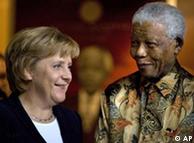 Merkel's backstory doesn't quite match that of South Africa's Nelson Mandela - Germans like her anyway
Merkel's backstory doesn't quite match that of South Africa's Nelson Mandela - Germans like her anyway
Her success might seem strange to those in countries where politicians need to be bigger than life to be elected, or should have the soaring rhetoric of Barack Obama to motivate, the hyperactive energy of France's Nicolas Sarkozy to energize, or the inspiring back-story of someone like Nelson Mandela to inspire. Those qualities are not Merkel's strong suits.
"She definitely lacks the traditional kind of charisma or she lacks some qualities of good speakers," Matuschek said. "However, people rather seem to appreciate her coolness."
Problem solver
Hearing Merkel speak at a party conference in the run-up to the Sept. 27 election, there is no high-flying rhetoric or emotive outbursts to work up the crowd. She simply lays out in calm, measured, perhaps even dull terms, her party's platform. There is little to be heard of a grand plan for a shining future – this is pragmatic stuff, which is always what Merkel has been concerned with.
"She is not a big visionary. She likes to solve the problems of today and not think about visions of the future," said Gerd Langguth, a political scientist at the University of Bonn who wrote a well-received biography of Merkel published in 2005.
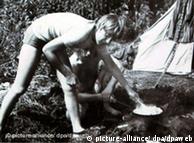 Angela Kasner, later Merkel, in 1973
Angela Kasner, later Merkel, in 1973
Merkel was born in Hamburg in 1954 to a Protestant pastor and a teacher. When she was a baby, her father moved the family to East Germany. While it is thought that her family had a friendly enough relationship with the communist regime there, her father's profession did raise suspicions. Merkel learned to be careful, Langguth said, and to think before she spoke. She knew that to get ahead, she had to excel.
"Because for political reasons, she was only able to study and go to high school because she was best in her class. This was her goal to be always her best. I would say this is the same today," he said.
Too timid?
But there are those who think Merkel has fallen short of her best, and that the caution she learned early in life has made her too timid to make big policy decisions. Especially when it comes to reforming Germany's welfare state. Michael Eilfort of the Market Economic Foundation in Berlin says Merkel "lacks courage" around her domestic agenda.
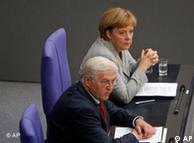 Merkel with Frank-Walter Steinmeier, current foreign minister and electoral opponent
Merkel with Frank-Walter Steinmeier, current foreign minister and electoral opponent
During the last four years, she was hobbled somewhat by the "grand coalition" government she presided over, an uneasy partnership between Merkel's conservative Christian Democrats and the left-of-center SPD. But Eilfort and others who want to see more market-friendly reforms have complained that Merkel is risk averse when it comes to unpopular moves that could alienate her domestic audience.
"My impression is that Ms. Merkel doesn't dare make needed reform steps if they are painful in the short term" he said. "The price for that down the road will be very high."
On the other hand, it is precisely her penchant for steering a path around potential minefields – such as deeper tax reform, further labor-market or health-care reforms – that has kept her poll numbers far above those of the SPD. As the world staggers through a severe recession, there is a sense of Merkel being the mother to the nation in troubled times.
"The chancellor is increasing pensions, the chancellor is leading the poor and anxious German out of the crisis like Moses through the Red Sea," said Gero Neugebauer, a political science professor at Berlin's Free University.
The authenticity factor
While Merkel is a conservative, she doesn't strike people as the fire-and-brimstone kind. That could be part of her appeal even to young people, according to Thomas Schneider of the Junge Union, the youth wing of the Christian Democratic Union and its Bavarian sister party, the Christian Social Union. In his opinion, Merkel – with her pantsuits and somewhat plodding demeanor – is appreciated for who she is. It's a welcome change from glad-handing, million-dollar-smile politicians.
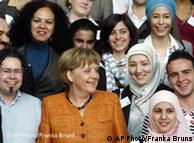 Merkel is not seen as an archconservative by many
Merkel is not seen as an archconservative by many
"I think that the young generation is expecting authentic people and I don't think they are looking for someone in their mid-50s or 60s who is playing for them on a Playstation" Schneider said.
He says inspiration also comes from her success in the middle of a party dominated by Catholic men (two things she is not), which not so long ago thought women should chair church committees, not G-8 conferences. Merkel, who entered politics only in 1990, broke that mold.
"It's very impressive how someone can make such enormous progress in such a short time," he said. "It's breathtaking."
Author: Kyle James
Editor: Nancy Isenson
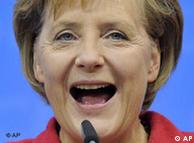

No comments:
Post a Comment